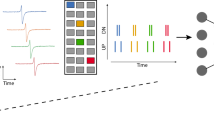Abstract
In this paper, a fully functional prototype of an asynchronous 4-to-4 Address Event Representation (AER) mapper is presented. AER is an event driven communication protocol originally used in VLSI implementations of neural networks to transfer action potentials between neurons. Often, this protocol is used for direct inter-chip communication between neuromorphic chips containing assemblies of neurons. Without an active device between two such chips, the network connections between them are hard-wired in the chip design. More flexibility can be achieved by communicating through an AER mapper: The network can freely be configured and, furthermore, several AER busses can be merged and split to form a complex network structure. We present here an asynchronous AER mapper which offers an easy and versatile solution. The AER mapper receives input from four different AER busses and redirects the input AE to four output AER busses. The control circuitry is implemented on an FPGA and is fully asynchronous, and pipelining is used to maximize throughput. The mapping is performed according to preprogrammed lookup tables, which is stored on external RAM. The mapper can emulate a network of up to 219 direct connections and test results show that the mapper can handle as much as 30× 106 events/second.
Preview
Unable to display preview. Download preview PDF.
Similar content being viewed by others
References
Dante, V., Del Giudice, P.: The pci-aer interface board, Telluride Workshop on Neuromorphic Engineering Report, pp. 99–103 (2001), http://www.ini.unizh.ch/telluride/previous/report01.pdf
Tan, S.Y., Furber, S.B., Yen, W.-F.: The design of an asynchronous VHDL synthesizer. In: Proceedings - Design, Automation and Test in Europe, pp. 44–51 (1998)
Häfliger, P.: Asynchronous Event Redirecting in Bio-Inspired Communication. In: International Conference on Electronics, Circuits and Systems, vol. 1, pp. 87–90 (2001)
Hauck, S., Burns, S., Borriello, G., Ebelingw, C.: An FPGA for implementing asynchronous circuits. IEEE Design & Test of Computers 11, 60 (1994)
Payne, R.: Asynchronous FPGA architectures. IEE Proceedings - Computers and Digital Techniques 143, 282–286 (1996)
Gertsner, W.: Basic Concepts and Models: Spiking Neurons, Ch. 1. Bradford Books (1998)
Mahowald, M.: The Silicon Optic Nerve from An Analog VLSI System for Stereoscopic Vision, Ch. 3. Kluwer Academic Publishers, Dordrecht (1994)
Author information
Authors and Affiliations
Editor information
Editors and Affiliations
Rights and permissions
Copyright information
© 2005 Springer-Verlag Berlin Heidelberg
About this paper
Cite this paper
Riis, H.K., Häfliger, P. (2005). An Asynchronous 4-to-4 AER Mapper. In: Cabestany, J., Prieto, A., Sandoval, F. (eds) Computational Intelligence and Bioinspired Systems. IWANN 2005. Lecture Notes in Computer Science, vol 3512. Springer, Berlin, Heidelberg. https://doi.org/10.1007/11494669_61
Download citation
DOI: https://doi.org/10.1007/11494669_61
Publisher Name: Springer, Berlin, Heidelberg
Print ISBN: 978-3-540-26208-4
Online ISBN: 978-3-540-32106-4
eBook Packages: Computer ScienceComputer Science (R0)




